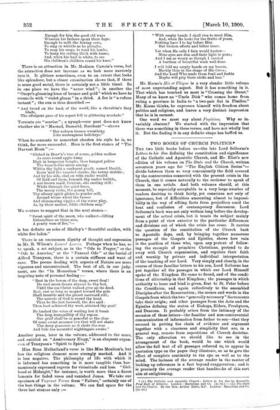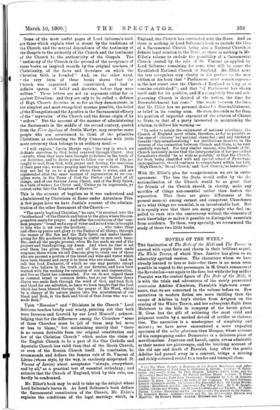TWO BOOKS OF CHURCH POLITICS.*
THE two little books before us—the late Lord Selborne's Letters to his Son defining the constitution and significance of the Catholic and Apostolic Church, and Mr. Eliot's new edition of his volume on The State and the Church, written seventeen years ago for "The English Citizen Series "— divide between them so very conveniently the field covered by the controversies connected with the present crisis in the Church, that it comes naturally to the reviewer to speak of them in one article. And both volumes should, at this moment, be especially acceptable to a very large number of readers desiring to think fairly, yet conscious not only of ignorance, but of difficulties amounting almost to impossi- bility in the way of sifting facts from prejudices amid the heat and confusion of contemporary discussion. Lord Selborne's book was not only written long before the develop- ment of the actual crisis, but it treats its subject mainly from a point of view anterior to the particular differences and divisions out of which the crisis has come. It carries the question of the constitution of the Church back to Apostolic days, and, by bringing together numerous passages of the Gospels and Epistles, shows how vain is the position of those who, upon any pretext of follow- ing the example of primitive Christians, pretend to do away with Church organisation, and regulate their faith and worship by private and individual interpretation of the teaching of our Lord. Very simply and clearly, in the course of these familiar letters to his son, Lord Selborne has put together all the passages in which our Lord Himself spoke of the Kingdom He came to found, and of the condi- tions of citizenship in that Kingdom ; the passages in which authority to loose and bind is given, first to St. Peter before the Crucifixion, and again collectively to the assembled Disciples after the Resurrection ; the scenes and words in the Gospels from which the two "generally necessary" Sacraments take their origin; and other passages from the Acts and the Epistles defining the status of Bishops, Elders, Presbyters, and Deacons. It probably arises from the intimacy of the occasion of these letters—the familiar and non-controversial communication of information from father to son—that they succeed in putting the chain of evidence and argument together with a clearness and simplicity that are, in a general way, remote from expositions of Church doctrine. The only alteration we should like to see in the arrangement of the book, would be one which would allow the full text of all passages referred to, to appear in quotation type on the pages they illustrate, so as to give the effect of complete continuity to the eye as well OA to the mind. The laziness of the average reader in the matter of looking up references is a fact beyond exaggeration; and it is precisely the average reader that handbooks of this sort aim at enlightening.
• (1.) The Catholic and Apostolic Church : Letters to his Son by Boundell, First Earl of Selborne. London : Macmillan and Co. pa 6d.)--(2.) The State and the Church. By the Hon. Arthur Elliot, M.P. London : Macmillan and Co. [26. 6d.] Some of the most useful pages of Lord Selborne's book are those which explain what is meant by the traditions of the Church, and the mutual dependence of the testimony of the Gospels to the authority of the Church and the testimony of the Church to the authenticity of the Gospels. The testimony of the Church is the ground of the acceptance of
those books as inspired records by the original teachers, of Christianity, of the facts and doctrines on which the Christian faith is founded." And, on the other hand, " the very form of those books shows that the Church was organised and constituted, and had a definite system of belief and doctrine, before they were written." These letters are not an argument either for or against Ritualism ; and they are only to be called a defence of High Church doctrine in so far as they demonstrate, in the simplest and most evangelical manner possible, the belief of the Evangelista and the Apostles in the Sacramental efficacy of the " mysteries " of the Church and the divine origin of its "orders." But the account of the manner of administering the Sacraments in the middle of the second century, quoted
from the-First Apology of Justin Martyr' may surprise some people who are accustomed to think of the primitive Christians as celebrating the Holy Communion with little
more ceremony than belongs to an ordinary meal :—
" I will explain," Justin Martyr says," the way in which we dedicate ourselves to God, being renewed through Christ. Our converts, when they have been brought to believe in the truth of our doctrines, and to desire power to follow our rule of life, are taught to seek from God, with prayer and fasting, the remission of their past sins, we also praying and fasting with them. Then they are led by us to -a place where there is water, and are regenerated after the same manner of regeneration as we our- Wan were, in the Name of God the Father and Lord of all things, and of our Saviour Jesus Christ, and of the Holy Spirit, in a bath of water; for Christ said, Unless ye be regenerate, ye cannot enter into the Kingdom of Heaven."
This is the account of baptism as it was understood and administered by Christians at Rome under Antoninus Pins. A few pages later we have Justin's account of the adminis- tration of the other Sacrament of the Church :—
" The newly baptised Christian," he says, "is received into the 4 brotherhood ' of the Church and taken to the place where the con- gregation meets for prayer. And after the conclusion of the com- mon prayers! bread and a cup of water and mixed wine is brought to him who is set over the brethren who takes them and offers up praise and glory to the Father of all things, through the names of His Son and the Holy Spirit, and makes thanks- giving for His goodness in deigning to confer on men such bene- fits; and, all the people present, when He has made an end of the prayers' and thanksgiving, say Amen. And when he that is set over them has given thanks, and all the people have made response, those whom we call Deacons give to every one of those who are present a portion of the bread and wine and water which have been blessed and carry it to those who are absent. And we call this food Eucharist, of which no one may partake except those who believe in the truth of our doctrine, and have been washed. with the washing for remission of sins and regeneration, and live as Christ has commanded. For we do not regard these as common bread or common drink ; but as our Saviour Jesus Christ was made flesh through the word of God, and took flesh and blood for our salvation, so have we been taught that the food which has been blessed through the prayer of His Word, which by a change of its nature passes into the nourishment of our blood and flesh, is the flesh and blood of that Jesus who was so made flesh."
Upon "Heresies" and "Divisions in the Church" Lord Selborne touches briefly and wisely, pointing out that both were foreseen and foretold by our Lord Himself ; acknow- ledging that for the differences among the Churches "some of those Churches must be (all of them may be) more or less to blame," but maintaining stoutly that "there
is no reason derivable from the original constitution and law of the Christian Church" which makes the claim of the English Church to be a part of the One Catholic and
Apostolic Church less valid than that of the Greek Church, or even of the Roman Church itself. In conclusion, he
recommends and defines the famous rule of St. Vincent of Lori= (whose style, by the way, is carelessly misprinted St.
Vincent of Looks) about acceptance "always, everywhere, and by all," as a practical test of essential orthodoxy ; and
submits that the Church of England, tried by this rule, can hardly be condemned.
Mr. Elliot's book may be said to take up the subject where Lord Selborne's leaves it. As Lord Selborne's book defines the Sacramental constitution of the Church, Mr. Elliot's explains the conditions of the legal marriage which, in
England, the Church has contracted with the State. And as there is nothing in Lord Selborne's hook to exclude the idea of a Sacramental Church being also a National Church in definite legal relation to the State, so there is nothing in Mr.
Elliot's volume to exclude the possibility of a Sacramental Church (tested by the rule of St. Vincent as applied by Lord Selborne) remaining for some time still to come the Established National Church of England. Mr. Elliot none the less recognises very clearly in his preface to the new
edition of his book that "Parliament most remain supreme in the last resort over the Church of England so long as it remains established " ; and that "if Parliament has shown itself unfit for its position, and if a completely free and self- governing Church is desired of the nation, the time for Disestablishment has come." One reads between the lines that Mr. Elliot has no personal desire for Disestablishment, or belief in its coming soon. He even descends so far from
his position of impartial exponent of the relation of Church to State, to that of a party interested in maintaining the relation, to deliver his warning
In order to retain the enjoyment of national privileges, the Church of England must retain, therefore, as far as possible in the eyes of citizens' her national character; and any tendency towards • denominationalising ' her institutions deserves, in the interest of the connection between Church and State, to be story carefully watched. For very similar reasons, wise friends of the Church anxiously desire that the interpretation of her prescribed formularies should be as wide as possible,' so that the Church, far from being identified with any special school of Protestant episcopalianism, should continue to comprehend within her fold, High Church,' Broad Church,' and Low Church,' as heretofore."
With Mr. Elliot's plea for comprehension we are in entire agreement. The loss the State would suffer by the de- nationalisation of the Church would be so great that the friends of the Church should, in charity, make any sacrifice of things non-essential rather than hasten the separation. That there are grave differenees at the present moment among earnest and competent Churchmen as to what things are essential, is an incontestable fact. But
it is equally sure that there are many people who feel im- pelled to rush into the controversy without the elements of such knowledge as makes it possible to distinguish essentials from accidents. To them, very specially, we recommend the study of these two little books.







































 Previous page
Previous page